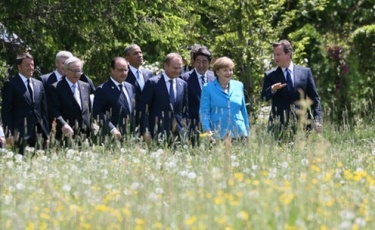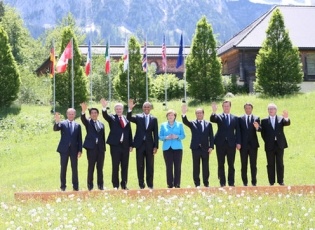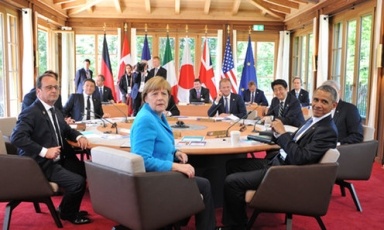G7/G8
G7 Summit 2015 in Schloss Elmau



1. Agenda and Schedule
(1) Participants
Chancellor Angela Merkel of the Federal Republic of Germany; Prime Minister Matteo Renzi of the Republic of Italy; Prime Minister Stephen Harper of Canada; President François Hollande of the French Republic; President Barack Obama of the United States of America; Prime Minister David Cameron of the United Kingdom; President Donald Tusk of the European Council; President Jean-Claude Juncker of the European Commission; and Prime Minister Shinzo Abe of Japan participated in the Summit.
(2) Schedule
Sunday, June 7
Session 1: World Economy, Growth, and G7 Values
Session 2: Trade and Supply Chain Standards
Working dinner: Foreign Policy
Monday, June 8
Session 3: Energy and Climate Change
Session 4: Terrorism (Outreach)
Working lunch: Development, Women, Health, and Africa (Outreach)
Note: The outreach meetings were attended by African countries (Liberia, Senegal, Ethiopia, Nigeria, Tunisia, and the African Union Commission (AUC)), Iraq, and major international organizations (the United Nations (UN), the International Monetary Fund (IMF), the International Labor Organization (ILO), the Organization for Economic Co-operation and Development (OECD), the World Trade Organization (WTO) and the World Bank).
2. Outline
(1) G7 Values, World Economy, and Growth
(i) G7 Values
Prime Minister Abe, who was asked to give an opening address, pointed out that this year marks the 70th anniversary since the end of World War II and the 40th anniversary since the Rambouillet Summit, and looking back, the G7 has underpinned the order of the international community, based on the fundamental values of freedom, democracy, human rights and the rule of law. Prime Minister Abe also stated that it is the G7 that is capable of reacting from a global perspective, that the responsibility of G7 members is significant, and that the solidarity of the G7 is becoming increasingly important.
(ii) World Economy
The leaders shared the view that the G7 issue a positive message on the world economy's continuing recovery, sustainability, and counter risk measures. Prime Minister Abe mentioned that Abenomics is producing steady results, and explained Japan's future initiatives on the economic and fiscal fronts. Prime Minister Abe also mentioned the “Partnership for Quality Infrastructure” that he announced recently, and explained Japan's contributions toward promoting quality infrastructure investment worldwide. Furthermore, the Asian Infrastructure Investment Bank (AIIB) was also addressed as part of the discussion on the world economy.
(2) Trade and Supply Chain Standards
The leaders confirmed the importance of political backing for maintaining and strengthening the multilateral trading system centered on the WTO, and efforts to conclude the Doha Round negotiations, and also discussed the promotion of Mega Free Trade Agreements (FTAs) (including the Trans-Pacific Partnership (TPP) and the Japan-EU Economic Partnership Agreement (EPA)). Prime Minister Abe stated that in order also to promote global economic growth, the G7 leaders should issue a strong message on deterring protectionism. He also explained that Japan has accepted the Trade Facilitation Agreement (TFA), and will proactively contribute to concluding the Doha Round, along with expressing his determination for an early conclusion of the TPP and the acceleration of the Japan-EU EPA negotiations. Furthermore, the Prime Minister emphasized the importance of thorough adherence to the WTO rules, including by emerging countries.
(3) Foreign Policy
(i) Ukraine and Russia
The leaders shared views to uphold the sovereign equality of all States as well as respect their territorial integrity and political independence, as well as international law. Upon this, a common view was reached to support for the efforts to find a diplomatic solution to the conflict, and that sanctions should be clearly linked to the implementation of the Minsk Agreement. Additionally, the leaders confirmed to support the steps the Ukrainian government is taking to implement comprehensive structural reforms.
Prime Minister Abe expressed the view that it is important to respond resolutely to changes in the status quo through force, while at the same time, continue to have dialogues with Russia over regional issues, and explained the outcomes of the meeting with President Poroshenko of Ukraine on the previous day.
(ii) East Asia
Given that the G7 Foreign Ministers had already issued the Declaration on Maritime Security, Chancellor Merkel invited comments from Prime Minister Abe. In response, Prime Minister Abe discussed developments in the rising tensions in the East China Sea and South China Sea such as large scale land reclamation, and pointed out that unilateral actions that seek to change the status quo in the seas must not be overlooked.
Additionally, Prime Minister Abe explained that the continuation of North Korea's nuclear and missile development programs poses a serious threat to both the region and the international community, and sought the cooperation of other countries on the abductions issue, which is a universal issue, as a violation of fundamental human rights.
(iii) Middle East
The leaders shared the view to support the efforts of the EU3+3 and Iran to achieve a comprehensive solution to the Iranian nuclear issue. The leaders also shared the view that they will make efforts to find lasting solutions for peace and stability in Syria, Libya, and Yemen.
(4) Energy and Climate Change
(i) Climate Change
With regard to climate change, the leaders shared the view that they will promote the adoption of a new framework “applicable to all parties” at the 21st session of the Conference of the Parties (COP21) to the UN Framework Convention on Climate Change (UNFCCC). Prime Minister Abe stated that Japan will actively contribute to the discussion on adopting the new framework, and explained Japan's position on its emissions reduction target (Intended Nationally Determined Contribution (INDC)), which is as equally ambitious as the other Parties'. The Prime Minister also explained Japan's support for climate change measures, including its contribution of 1.5 billion U.S. dollars to the Green Climate Fund (GCF).
(ii) Energy
Regarding energy, Prime Minister Abe explained Japan's energy mix, and remarked on the importance of having diverse energy sources including nuclear power, renewable energy, and fossil fuels; strengthening natural gas security, including liquefied natural gas (LNG); and supporting Ukraine.
(5) Terrorism
The G7 leaders, along with the leaders of Tunisia, Nigeria and Iraq, confirmed that the fight against terrorism and violent extremism remain the priority for the whole international community. They also shared the view that coordination and cooperation among the G7 and the international community is important.
Prime Minister Abe emphasized the need for measures in dealing with the breeding grounds for terrorism, and expressed his continued determination to never give in to terrorism, based on the philosophy of “the best way is to go in the middle,” as he stated in Cairo.
(6) Development, Women, Health, and Africa
(i) Development
The leaders shared the view that the G7 will provide political backing to ensure the Post-2015 Development Agenda becomes a framework that is based on wide-ranging cooperation between the governments, private sectors and civil societies of all nations, not only developed nations. Prime Minister Abe explained Japan's position on the Post-2015 Development Agenda, and requested for the support of other countries on a proposal to the UN to designate November 5 as “World Tsunami Day,” as a follow-up to the Third UN World Conference on Disaster Risk Reduction held in Sendai in March.
(ii) Women
The leaders shared views on the G7 Principles on Women's Entrepreneurship and the establishment of a G7 working group on women, and discussed women's empowerment. Prime Minister Abe highlighted Japan's efforts to create “a society in which women shine,” including Japan's support for developing countries and its hosting of the “The World Assembly for Women in Tokyo: WAW!”
(iii) Health
The leaders confirmed that the G7 will coordinate its responses to 1) antimicrobial resistance (AMR); 2) neglected tropical diseases (NTDs); and 3) public health emergencies (Ebola etc.). Prime Minister Abe explained Japan's measures to contribute to the health field, where it has been performing a leading role thus far, and explained Japan's contributions in response to the Ebola virus disease, including the 170 million U.S. dollars it has contributed thus far to achieving “zero cases” in all countries.


 (428KB)
(428KB)